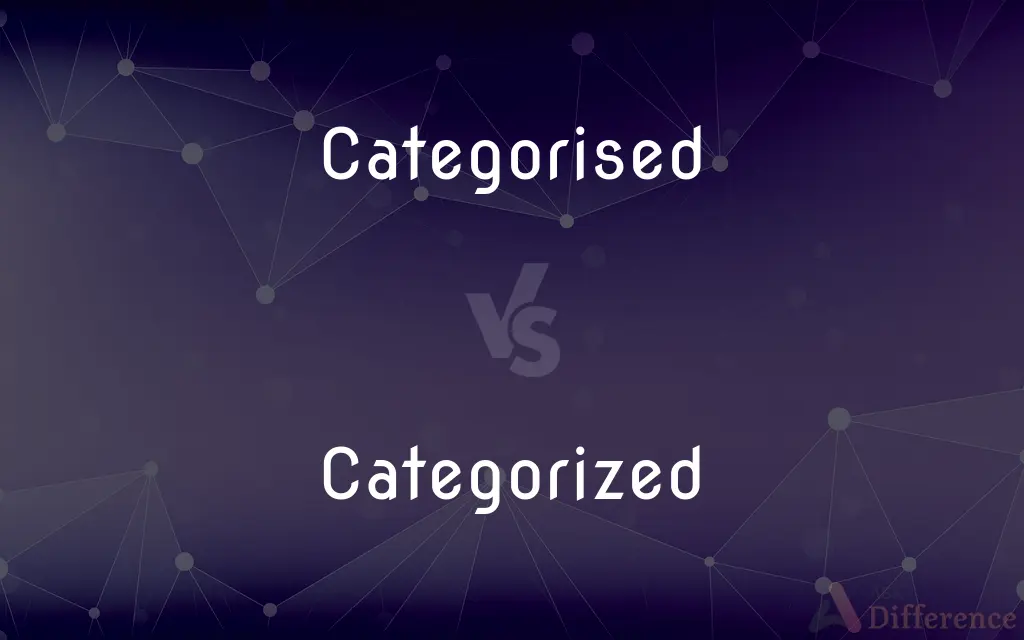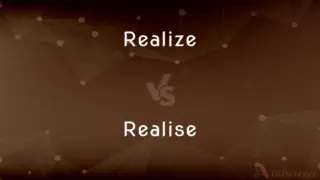Categorised vs. Categorized — What's the Difference?
By Tayyaba Rehman — Published on December 30, 2023
Categorised and Categorized mean the same: to classify or place in a particular category. The difference lies in the spelling: "Categorised" is British English, while "Categorized" is American English.

Difference Between Categorised and Categorized
Table of Contents
ADVERTISEMENT
Key Differences
"Categorised" is a word that belongs to British English. This spelling convention follows the general rule where words in British English end in "-ise." On the other hand, "Categorized" is rooted in American English. Here, the convention is to end similar words with "-ize."
Both "Categorised" and "Categorized" come from the verb "to categorise/categorize." They both refer to the act of placing something into a specific category or group based on shared characteristics. The difference between them does not pertain to their meanings but to regional linguistic preferences.
While both spellings are understood internationally, it's crucial to be consistent in one's writing. For example, a British academic paper or publication would likely use "Categorised," while an American one would use "Categorized." Both words are completely correct in their respective contexts.
Finally, it's worth noting that as English becomes more global, and as writing, reading, and media consumption become increasingly international, there might be some overlap or interchangeability in usage. However, for the sake of clarity and consistency, it's always best to stick to one form or the other, depending on the intended audience.
Comparison Chart
Origin
British English
American English
ADVERTISEMENT
Common Suffix
-ise
-ize
Meaning
To classify or group
To classify or group
Used in Publications
Typically British sources
Typically American sources
Example Publication
The Guardian
The New York Times
Compare with Definitions
Categorised
Arranged systematically.
The library books were categorised by genre.
Categorized
Organized according to type.
The shirts were categorized by size.
Categorised
Distinguished by characteristics.
The participants were categorised by age.
Categorized
Differentiated by features.
The survey responses were categorized by region.
Categorised
To have placed in a specific category.
The items were categorised by color.
Categorized
To have sorted into categories.
The teacher categorized the assignments by topic.
Categorised
Classified based on shared traits.
The animals were categorised as endangered.
Categorized
Systematically arranged.
The data was categorized into neat tables.
Categorised
Grouped methodically.
The files were categorised alphabetically.
Categorized
Grouped in a logical manner.
The movies were categorized by release date.
Categorised
Simple past tense and past participle of categorise
Categorized
To put into a category or categories; classify.
Categorised
Arranged into categories
Categorized
Simple past tense and past participle of categorize
Categorized
The characteristic of having been placed or sorted in a category or categories.
All of my records are categorized.
Categorized
Placed in a category.
Categorized
Arranged into categories
Common Curiosities
Where would "Categorized" be more common?
In American publications such as The New York Times or The Washington Post.
Which is the correct spelling: Categorised or Categorized?
Both are correct. "Categorised" is British English, while "Categorized" is American English.
Are there other similar British vs. American spelling differences?
Yes, like "realise" (British) vs. "realize" (American).
Why do these spelling differences exist?
They've evolved due to historical, cultural, and linguistic factors unique to each region.
Do both words have the same meaning?
Yes, they both refer to the act of classifying or placing into a category.
In which publications might I see "Categorised" used?
In British publications like The Guardian or The BBC.
Is one form more 'correct' than the other?
No, both forms are correct in their respective contexts.
Can I use "Categorised" in American English writing?
While it would be understood, "Categorized" is the preferred spelling in American English.
In international publications, which spelling should I use?
It depends on the target audience, but it's crucial to be consistent.
If I write to a British audience, which should I use?
"Categorised" would be more familiar and appropriate.
Are there tools to help me maintain consistent spelling?
Yes, many word processors have region-specific spell checks.
What about writing for a global audience?
Choose one based on your primary audience, but ensure consistency.
How did these different spellings come about?
They evolved over time due to various linguistic and cultural influences in the UK and the US.
Are these words used in the same contexts and situations?
Absolutely, the context doesn't change, only the spelling does based on the regional preference.
Are there cases where one spelling might be used in the 'wrong' context?
Yes, with global communication, overlaps occur, but it's best to stay consistent.
Share Your Discovery

Previous Comparison
Swift VXi vs. Swift ZXi
Next Comparison
Realize vs. RealiseAuthor Spotlight
Written by
Tayyaba RehmanTayyaba Rehman is a distinguished writer, currently serving as a primary contributor to askdifference.com. As a researcher in semantics and etymology, Tayyaba's passion for the complexity of languages and their distinctions has found a perfect home on the platform. Tayyaba delves into the intricacies of language, distinguishing between commonly confused words and phrases, thereby providing clarity for readers worldwide.













































